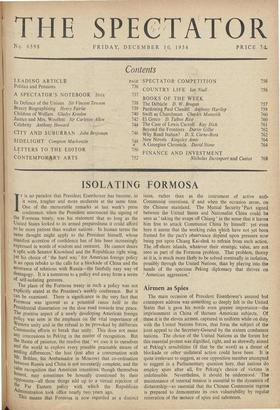ISOLATING FORMOSA
IT is no paradox that President Eisenhower has become, as it were, tougher and more moderate at the same time One of the memorable remarks at last week's press conference, when the President announced the signing of the Formosa treaty, was his statement that so long as the United States looked to its armed preparedness it could afford to be more patient than weaker nations. In human terms the same thought might apply to the President himself, whose manifest accretion of confidence has of late been increasingly expressed in words of wisdom and restraint. He cannot desire a split with Senator Knowland and the Republican right wing, Yet his choice of 'the hard way' for American foreign policy Is an open rebuke to the calls for a blockade of China and the severance of relations with Russia—the fatefully easy way of demagogy. It is a summons to a policy and away from a series of self-isolating gestures.
The place of the Formosa treaty in such a policy was not explicitly stated at the President's weekly conference. But it can be examined. There is significance in the very fact that Formosa was ignored as a potential casus belli in the Presidential dissertation on the slow road towards true peace. The positive aspect of a newly developing American foreign Policy was seen in the emphasis on the vital importance of Western unity and in the refusal to be provoked by deliberate Communist efforts to break that unity. This does not mean any concessions to Peking in the matter of recognition. But the theme of patience, the resolve that 'we owe it to ourselves and the world to explore every possible peaceable means of settling differences,' the hint (just after a conversation with Mr. Bohlen, his Ambassador in Moscow) that co-ordination between Russia and China is not necessarily complete, and the Calm recognition that American intentions, though themselves honest, may sometimes be honestly questioned by their 0Pponents—all these things add up to a virtual rejection of the Far Eastern policy with which the Republican Administration took office nearly two years ago. This means that Formosa is now regarded as a distinct issue, rather than as the instrument of active anti- Communist intentions, if and when the occasion arose, on the Chinese mainland. The Mutual Security 'Pact signed between the United States and Nationalist China could be seen as 'taking the wraps off Chiang' in the sense that it leaves him free to attack Communist China by himself: yet even here it seems that the working rules which have not yet been framed for the pact's observance depend upon pressure now being put upon Chiang Kai-shek to refrain from such action. The off-shore islands, whatever their strategic value, are not seen as part of the Formosa problem. That problem, thorny as it,is, is much more likely to be solved eventually in isolation, possibly through the United Nations, than by playing into the hands of the specious Peking diplomacy that thrives on American aggression.'








































 Previous page
Previous page